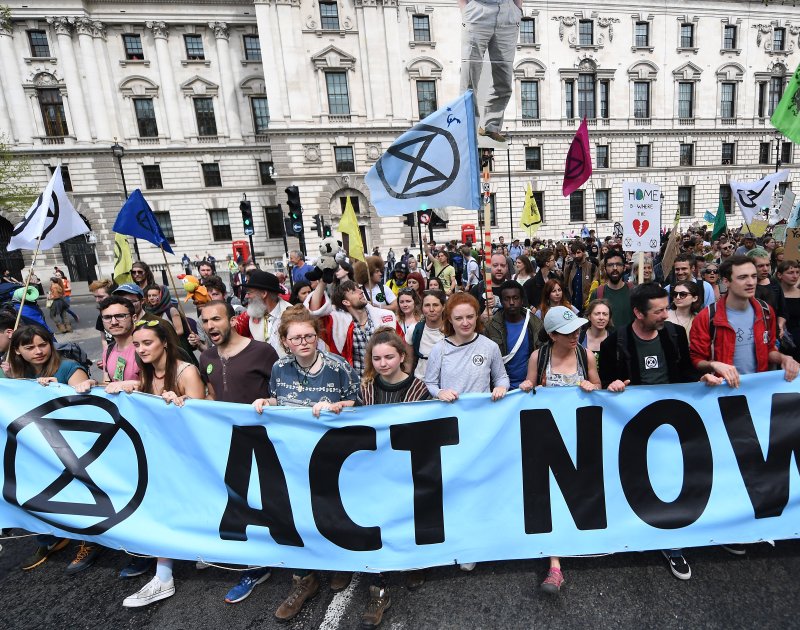Over 1,000 Scientists from 25 Countries
Took Part in the Scientist Rebellion Protests
Margaret Osborne / Smithsonian Magazine
(April 16, 2022) — Over 1,000 scientists from 25 different countries staged protests last week following the release of the Intergovernmental Panel on Climate Change’s new report. The report warned that rapid and deep cuts to greenhouse gas emissions are necessary by 2025 to avoid catastrophic climate effects.
The group, called the Scientist Rebellion, writes in a letter that “current actions and plans are grossly inadequate, and even these obligations are not being met.” Their protests “highlight the urgency and injustice of the climate and ecological crisis,” per a statement from the organization.
In Los Angeles, scientists including Peter Kalmus, a NASA climate scientist with the Jet Propulsion Laboratory, chained themselves to the JP Morgan Chase building.
“We’ve been trying to warn you guys for so many decades,” Kalmus says, his voice shaking. “The scientists of the world have been being ignored. And it’s gotta stop. We’re going to lose everything.”
They were met by about 100 police officers in riot gear and arrested, reports Salon’s Eric Schank.
@moreperfectunion LAPD met four scientists chained to Chase Bank with riot gear and arrested them during a peaceful civil disobedience for climate urgency #nasa #climate #fyp #foryou#scientist #extinctionrebellion ♬ original sound – More Perfect Union

Scientists historically have had differing opinions about becoming activists on topics related to their work, but that has started to change in recent years, reports Chelsea Harvey for E&E News.
Kalmus has written several opinion pieces in the Guardian about climate change, calling for the end of the fossil fuel industry and a switch to renewables.
“It’s now the eleventh hour and I feel terrified for my kids, and terrified for humanity,” he writes in a Guardian op-ed. “I feel deep grief over the loss of forests and corals and diminishing biodiversity. But I’ll keep fighting as hard as I can for this Earth, no matter how bad it gets, because it can always get worse. And it will continue to get worse until we end the fossil fuel industry and the exponential quest for ever more profit at the expense of everything else.”
Scientists around the world expressed similar fears during protests last week, and demanded rapid action to address climate change from their governments.
Scientist Rebellion protesters in Washington, D.C. chained themselves to the White House fence. Spanish scientists threw fake blood over the facade of the National Congress. Panamanian scientists staged demonstrations at various embassies, and German protesters glued themselves to a bridge. In Malawi, scientists held a teach-in at Lilongwe University of Agriculture and Natural Resources, per the Scientist Rebellion statement.
Protesters from Scientist Rebellion doused the outside of the Spanish Parliament in red liquid on Wednesday. The act was part of a number of direct actions organized in 25 different countries to convince world governments to take more aggressive action against the climate crisis.
— NowThis (@nowthisnews) April 7, 2022
“Listen to the scientists,” Amwanika Sharon, a Scientist Rebellion member protesting oil exploration and refinery construction in Uganda, says to Common Dreams’ Jessica Corbett. “Hear the voices of activists. Climate justice now.”
Scientist Rebellion was founded in 2020 by Ph.D. students in Scotland, who were, in part, inspired by the Extinction Rebellion, per the AFP. The Extinction Rebellion is a “movement using non-violent direct action and civil disobedience to persuade governments to act justly on the Climate and Ecological Emergency,” per its website.
“I am not sure this is our last chance, but time is definitely running out,” Jordan Cruz, an environmental engineer in Ecuador, writes to the AFP’s Marlowe Hood in an email. “I am terrified,” he writes. “But it’s the kind of fear that motivates action. It is survival.”
The Scientist Rebellion members have led several protests before, including at COP26 in Glasgow, at universities across the U.K. and in front of the Royal Society, per its website. Last year, the organization leaked a draft of the IPCC report.
“Scientists are particularly powerful messengers, and we have a responsibility to show leadership,” Charlie Gardner, a conservation scientist at the University of Kent, tells AFP. “We are failing in that responsibility. If we say it’s an emergency, we have to act like it is.”
Posted in accordance with Title 17, Section 107, US Code, for noncommercial, educational purposes.


